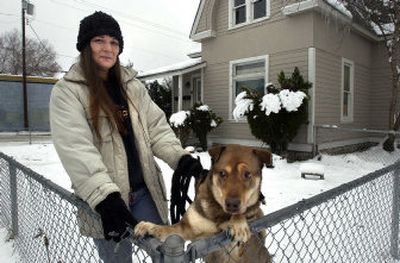Rents outpace pay for region’s working poor

Rising rents are increasingly squeezing the working poor, forcing full-time workers to choose between paying the landlord or paying heating bills, according to a national study released Tuesday.
Workers in Spokane County must earn $12.19 an hour to afford a two-bedroom apartment – about an 11 percent increase in the past year, according to the study by the National Low Income Housing Coalition. Coeur d’Alene is close behind at $12 an hour.
In Spokane County, a person earning minimum wage must work 66 hours a week to afford the fair market rent on the two-bedroom household, a federally established figure.
“People will choose to cut all other corners before losing their homes,” said Shane Rock, executive director of the Washington Low Income Housing Alliance. “They won’t go to the doctor, turn on the heat, maintain their car, or eat a normal-sized meal … until it becomes an emergency.”
The study adds to the growing body of research indicating that rising rents and the hot real estate market are forcing workers to put more of their paychecks toward housing costs in recent years. Last summer, a study found that housing prices grew about twice as fast as wages between 2003 and 2005.
As housing affordability has dropped, rental prices have increased, said Glenn Crellin, director for the Washington Center for Real Estate Research at Washington State University. Crellin, who did not work on the study released Tuesday, said rental prices often do not include electricity and heating costs. “It is an extreme burden on those households’ budgets,” Crellin said. “Without federal or state subsidy programs, those households would be in very dire straits.”
In July, with a waiting list of more than 5,000, Spokane’s federally subsidized housing program stopped taking names, citing cuts and the growing number of families in need.
Even so, Spokane’s rents remain markedly cheaper than Seattle’s, though rents increased in both areas in the past year, the study found. A typical two-bedroom apartment in Seattle costs $840 a month, while a similar apartment in Spokane costs only $634. In Kootenai County, the same apartment would rent for $624, about $20 more per month than in 2004, the study found.
Statewide, the study estimated that workers in Washington and Idaho must earn hourly wages of $14.55 and $11.60, respectively.
In Spokane, more than 55,000 households, or about one-third of the total, occupy rental units. Each year, nearly 2,000 unlawful-detainer notices are filed in Spokane County, though not all of them lead to eviction.
Jude Lawless, a 53-year-old Spokane woman, has lived in her two-bedroom West Central duplex for nearly a decade. Lawless, who receives $599 a month in federal disability, said she longs to move to a better neighborhood but cannot afford to pay more than $400 a month in rent.
Lawless said burglars have attempted to break into her apartment three times but were chased away by her son and two dogs.
Frustrated by drug sales in the neighborhood, she has begun helping local police. Deterioration and damage to her 1901 duplex have gone unrepaired.
“I’ve looked at the cost of rents, and I just can’t afford to live anywhere else,” said Lawless, who has osteoarthritis and scoliosis, a painful spinal condition.
The study estimated that a person living on a disability payment can afford to pay $174 a month in rent. Lawless said she budgets carefully, but still struggles to pay her bills.
“I don’t buy very much,” she said.